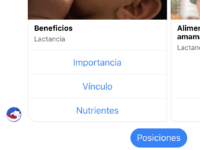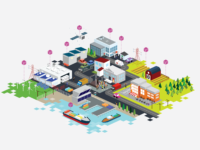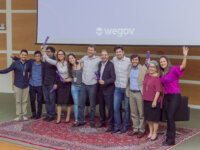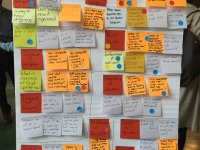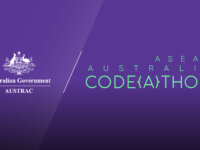« DK Plus de Mobilité » is an ambitious transportation policy led by the Dunkirk Urban District Council. This project aims to increase the share (less than 7%) of public transit in the Dunkirk area (200 000 inhabitants). The main challenge and specificity of this project – developed in consultation with local population - consists in combining the upgrading and modernization of transport infrastructures with the implementation of free public transport for all.
Innovation Tag: Experimentation
In Argentina 30% of women do not comply with prenatal check-ups and almost 1 in 10 have their first contact with the health system at the time of birth.
"Crecer con Salud" is a virtual assistant based on Facebook Messenger that works outside the health system, identifying and recruiting pregnant women where they are. The bot is designed to accompany women during their pregnancy and the baby's first year with personalized information and reminders of attendance to pre and post natal check-ups.
The European Commission led #Blockchain4EU as a forward-looking exploration of existing, emerging and potential Blockchain and other DLTs (Distributed Ledger Technologies) applications for industrial sectors. Through an experimental and participatory approach, this project allowed first to come up with an overview of promising applications across industries, and second to co-design five prototypes that physically showcase how Blockchain could be applied in the near future.
Reliable transportation is the primary barrier to stable employment for shift workers. Our solution leverages existing technology to provide “transportation as a benefit” through an integrated network of on-demand transportation options. We will quantify savings for employers due to reduced turnover and increased employee productivity, incentivizing them to fund the program long-term.
Canada Beyond 150 was an experiment in leadership development for a diverse cohort of new public servants, with the goal of encouraging a culture shift to a more open and innovative public service. Working in groups part-time over a year, participants learned foresight, design thinking and external engagement methods and applied them to complex policy issues, with a focus on diversity and inclusion. It demonstrated the power of experiential learning, especially from engagement with stakeholders.
HubGov is an interinstitutional program of innovation in Government that has the participation of institution from the three spheres and three powers. Through a learning trail in innovation and intrapreneurship skills, each institution comes up with a complex challenge and at the end of the program presents a solution proposal to this challenge.
Louisville, like many cities, experienced a spike in homicides starting in 2016. Recent deployment of gunshot detection technology has been effective at pinpointing where and when gunshots occur. On average, police officers arrive long after the critical, first ten minute window to stabilize injuries. Placing drones strategically throughout our city, we will be able to deploy a camera to the scene within 90 seconds of when a gun is discharged and rapidly dispatch emergency medical personnel.
AUSTRAC is the first known government law enforcement or intelligence agency to run a global Codeathon forum. AUSTRAC leveraged innovation, collaboration and exploited technology to improve its business operations, develop efficient new solutions in consultation with government partners, industry, academia and the private sector.
Case Study
Integrating Design and Behavioural Insights to increase the take-up of an education savings program…
The Canada Learning Bond, a government education savings program providing a financial incentive to low income Canadians, turned to behavioural insights (BI) to tackle persistent low take-up. Following unsuccessful BI trials based on academic literature and expertise, we turned to Design. In a Government of Canada first, combining lessons learned from human centred design processes including stories from citizens and BI we developed outreach that significantly improved the take-up of the Bond.
Experimentation Works (EW) is a Government-of-Canada initiative to build public servants’ capacity in experimentation skills and practice through a learning-by-doing model that supports and showcases 5 small-scale experiments in the open. EW seeks to generate practical examples of experiments and ensure open access to learning materials, progress updates and results for broad impact. It works by connecting project teams with each other, and with experts in a open-by-default “cohort model."

